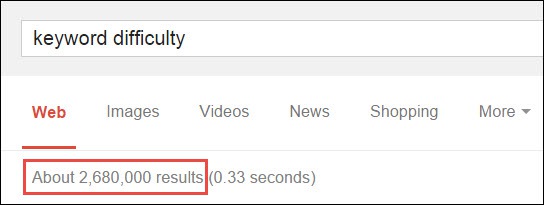Most people would acknowledge that the contents of your site will play a major role in determining your SEO strategy. Few marketers or SEOs would argue the strategy for a large news-oriented publishing site versus a large e-commerce site versus a small SaaS site will be distinctly different, with varying level of emphasis on technical issues, content strategies, and link building tactics for each.
It’s also pretty obvious that the amount of money and headcount you have to dedicate to your SEO efforts will impact what you can and can’t do as it relates to SEO.
But there’s a third important factor in designing your SEO strategy.
What about the specific niche that you’re in? Should your niche impact your SEO strategy?
The short answer is: absolutely, yes.
The longer answer is that there are some basic considerations (and several related questions) you need to keep in mind in when devising your SEO strategy. In this post I’ll walk through each of those, and show you how to think about each consideration to ensure you are focusing on the right tactics and getting the most leverage possible out of your SEO efforts.
Key Consideration #1: The Searching and Buying Behavior in My Niche

The first thing to think about related to your niche in developing an SEO strategy is how do people (and particularly your ideal prospects and customers) search and ultimately buy things?
To help give some additional context throughout this post, I’m going to imagine I have four different businesses in four dramatically different niches (then I’m going to imagine taking a nap, because I think I’ve bitten off more than I can pretend to chew), and I will outline an SEO strategy for each (again these are all entirely fictional companies, I’m giving them – mostly terrible – made up names for the sake of easy reference later in the post):
- Light Bulb Co.: An e-commerce store that sells thousands of different types of light bulbs.
- Premier Mail Co.: A high-priced, complicated enterprise software solution specifically designed to handle nurturing and email marketing for companies with email lists of over 100,000 people.
- Celtics Optimism: A news site focusing on Boston Celtics news and updates that publishes five posts a day during the season and one to two in the offseason (though I may have some general enthusiasm lag / blogging fatigue for the next couple seasons – not that I’m complaining, generally).
- PayDay Pro: A PayDay loans lead gen site.
For each of these sites, I want to think about a few important high level considerations as it pertains to search behavior:
- Do the people in my niche who are my prospects even search specifically for what I sell / what directly grows my business?
- What else do my prospects and customers likely search for?
- Can I create content (or do I have existing content) to match those search queries?
- Do I have a long sales cycle?
- Are people especially skeptical of companies like mine (or just in general) in my niche?
- Do people typically buy based on referral in my niche?
- Is my product something that’s frequently bought on Amazon or a similar marketplace (am I listed there)?
- Is my product something that’s a commodity that people in my niche will buy mainly based on price and a few must-have features?
The answers to these questions will vary wildly from niche-to-niche (and product to product), and should impact my SEO strategy significantly:
Light Bulb Co. – If people looking for light bulbs frequently use broader, category level terms like “LED light bulbs” or “cheap LED light bulbs,” I’ll need to have a significantly different SEO strategy than if most of the search volume were around specific models and brands of light bulbs (eg “Phillips 100W LED light bulbs”). I’ll want to emphasize the content I have focused around the higher volume terms in:
- My information architecture decisions
- Determining where I put emphasis in fleshing out my site’s content
- Determining what type of new content to create.
Assuming people typically buy based on a specific set of features and price, I need to incorporate that into different elements of my SEO as well (my title tags and meta descriptions, how I incorporate content onto product pages, etc.)
Premier Mail Co. – For my enterprise email marketing company, I need to understand how my actual prospects search. When I look at keyword data, I’ll likely see volume for “email marketing software,” but the CMO prospects I’m targeting don’t just go to Google, type in “email marketing software” and click add to cart. In fact, “email marketing software” may be a terrible term for me to target based on the fact that it’s likely to be extremely competitive while the vast majority of traffic will be from searchers looking for a cheaper offer. Instead, I should consider options like:
- Adding modifiers like “enterprise” or finding alternative terms that people use to talk about a complex email tool (like “marketing automation”)
- Thinking about other things CMOs search for. Information retrieval is pretty big with kids these days (and my parents…and everyone else), so my prospect is probably searching for something, even if there’s not a ton of relevant search volume for the keywords I’d immediately associate with my product. What other tools do CMOs use? What other problems do they have? I may have to create something like a list of the “best tools to create great board level marketing presentations”, a great “CMO’s Guide” to a trending topic that a CMO is likely to be unfamiliar with, or similar and target these types of tangential keywords with that content.
- Responding to specific pain points related to my product – by identifying some of the specific things my prospect typically really hates about email marketing software I can uncover some new keywords to target.
The fact that I likely have a long sales cycle (and lots of questions to answer) means I’ll want to spend a lot more time mapping content to the different stages of my buying cycle.
Celtics Optimism – My Celtics blog has a much different “prospect” or audience, monetization mechanism, and as a result needs a much different SEO strategy. Extremely general terms like “basketball blog” likely won’t be relevant or get actual clicks on my search listing. Even a term like “Celtics blog” might get me some traffic with folks who come to the site and start reading my blog, but most of the search opportunity is probably around trending topics. Further, my “prospects” don’t need to buy anything from me or take a specific action (unless I’m pushing them to a newsletter or similar), but they do need to consume my content to help with ad revenues, so I’m focused more on high volume queries and / or queries that might capture regular readers. All of this will strongly impact the way that I’ll structure my site and the terms that I work to target, pushing me to focus on a more publishing-specific SEO strategy.
PayDay Pros – From a search perspective the PayDay loan space is a bit of a mess that gets plenty of attention from Google and is an extreme case, but it also has some similar (albeit more extreme) characteristics to other loan verticals, education, gambling, pharma, etc. and is probably the single most illustrative example of a niche having a major impact on SEO strategy. In terms of the way people search and buy, it’s important for me to understand what “buyers” or people who are actually issued these loans purchase because I’ll be paid (or at least graded / evaluated) based on the quality of leads I drive. Additionally, I obviously need to understand the way that people search for these products – as I’ll get into in the next two key considerations (the community and competition in and around your niche) I’ll need to know if there’s a “tail” of modified terms and/or additional ways of talking about this product (eg “get a loan quickly”) because I happen to be in an extremely high competition niche that is very, very difficult to get links for. Additionally, in all of my site’s copy, title tags, and meta descriptions I’ll once again need to understand how my prospects think about the product and address concerns while also emphasizing the benefits (in copy and in keyword ideation) they’re focused on like speed, rate, etc.
Applying This to Your Niche
Understanding buying / consumption behavior should really be something you’re focused on organization-wide that’s deeply baked into the decisions you’re making in marketing in general, but what if you’re looking to understand more about how to find the best keyword strategy to fit your niche and your prospects? Here are some extremely useful resources to get you started in understanding search behavior for your prospects and customers:
- Moz’s beginner’s guide to keyword research
- Backlinko’s excellent, comprehensive keyword research guide
- Nick Eubanks’ free (older) post on keyword research and his newer (paid) course
Now that I better understand the searching and buying behavior in my niche, I need to incorporate the linking audience and the community around my niche into my SEO strategy.
Key Consideration #2: The Linking/Sharing Audience and Community in My Niche

Any SEO strategy obviously has to take into account how links are going to be acquired. I need to customize my SEO strategy to what links are available in my niche. This will, once again, be dramatically different from niche-to-niche. The basic questions I’ll want to ask in this instance are:
- Does anyone actually write about my topic?
- Do those writers link to sites like mine? Are people inclined to share content from sites like mine? Are other similar sites able to get editorial links in my niche?
- What other types of things do people link to and share? Can I create assets like those?
Let’s look at how each of these questions will impact the SEO strategy for the varied companies I’m building:
Light Bulb Co. – As you might imagine the pickings for light bulb blogs are pretty slim, so I’m going to need to find some other ideas for getting links and shares. The good news here is that my prospects are basically anyone who needs light bulbs, and if I just go a level or two broader than light bulbs and start to look at topics like “home improvement”, “interior decorating”, and similar I can find a large vein of content producers who have the attention of my audience. I’ll tailor my link building strategy to this audience and create content for them, try to have content placed on these sites, etc.
Premier Mail Co. – In once sense my email marketing company is in luck from a linking and sharing audience perspective: there are a lot of marketing oriented blogs and websites, and marketers generally index as being particularly active on social networks, so there’s a large and active linking and sharing audience. The downside here is that there’s also a lot of competition for attention, so again I’ll have to dig deep and identify specifically what works best for getting links and shares in this niche.
Celtics Optimism – Once again the upside here is that there are a ton of different basketball blogs (there are even several already focusing on the Celtics) and there is a large audience of potential sharers in rabid Celtics fans, as well. The downside persists here as well, however, with competition for attention being stiff. It’s also important to note that the nature of content that gets linked to for a daily Celtics blog will be significantly different from for Premier Mail. Some cornerstone, evergreen assets can likely do well in this niche (ESPN’s trade machine is a good example with links from 600+ unique domains) but much of the link equity in this niche gets distributed based on breaking news and/or instant analysis of recent events (not unlike the shape of the way that people search in this niche). This means a radically different link building strategy that relies more on persistent relationships with news-oriented bloggers and content production focused around the things that audience of linkers likes.
PayDay Pros – Again, my approach will likely need to be radically different for my PayDay site based on the niche. There is obviously a ton of skepticism about PayDay loans, and it’s notoriously difficult to attract “natural” links to a PayDay loan site, so I may have to totally abandon most of the lower risk link building tactics that would be effective, or at the very least would have to come up with an amazingly creative (and likely very difficult and expensive) strategy for getting links and shares to a site that’s actively driving PayDay loan leads.
Applying This to Your Niche
There’s a good amount of nuance here, because even if “shares” are available in your niche, you need to understand how to unlock them (while both marketers and home owners are niches that share content, the things that will hook them have both similarities and differences).
If you’re not sure how to identify the linkers and sharers in your niche, you’re in luck – our niche (online marketing) has cranked out lots of great information on the topic:
- BuzzSumo is my (and many marketers’) favorite tool for this type of research. You can check out Mathew Barby’s excellent video tutorial / review, you can learn more about how Larry Kim and the WordStream team uses it, or check out Linkarati’s in-depth tutorial as well.
- In his post on content promotion Giles Thomas shares some great tips on identifying influencers in your niche, as well.
- As part of their excellent advanced guide to content promotion BuzzStream also covers the topic (and they also write some great stuff about influencer marketing frequently on their blog)
- And Search Engine Journal has also covered both influencer marketing 101 and “ego bait,” getting into the subject of identifying influencers (i.e. linkers and sharers)
Now that I’ve incorporated both the linking/sharing audience and the searching and buying behaviors of the prospects in my niche, I have a third key consideration to take into account: competition.
Key Consideration #3: The Competitiveness of My Niche

A combination of my available resources and how difficult it will be to actually rank my site and my pages will greatly impact my SEO strategy and how I allocate resources. The questions I need to answer for my various businesses here are:
- Can I actually rank for any of the things my prospects are looking for with my current content and resources?
- What kind of content is in my niche (is the bar for great content that will get shared and linked to low, is my niche flooded with great content that will be difficult to stand out from, are certain tactics over or under used)?
Let’s look at how I can take these factors into account and apply this across my empire of unrelated businesses:
Light Bulb Co. – Having looked at how people search and the links and shares available in my niche, I need to figure out which terms can I actually drive traffic around? If there are a lot of older, more authoritative, established players ranking for broader terms like “LED light bulbs” and I have limited content / development / design resources, I may have to shift my keyword focus to less competitive, longer tail terms. Or if I have a limited budget and very little hope to rank for the terms driving the lion’s share of the traffic, I might even pare down my SEO efforts altogether and invest in other marketing channels.
Premier Mail Co. – There is already a lot of content being created by other email marketing / marketing automation vendors targeting the same customers I’m chasing, and the higher volume search terms are extremely competitive while including a lot of searches from people interested in a different type of product. If I don’t have a lot of budget or anyone on my team who I feel confident can create engaging content, once again: my shift in SEO strategy may e to pare down my SEO efforts and invest in other channels. Conversely, if I know there are topic areas that are a core competency of folks on my team that will be of interest to my target and aren’t being covered, that could have a dramatic impact on my content and SEO strategies for link acquisition as well as keyword targeting.
Celtics Optimism – If I know the Celtics / NBA blogging niche is extremely competitive, and a lot of the links are generated by those who break news, and that my team isn’t particularly successful here, I’ll have to come up with other angles to get links and traffic. Conversely, if the current Celtics bloggers are mainly “re-blogging” and I just hired a superstar journalist, that will shift some of my focus in terms of terms I’d want to target, how I want to architect my site.
PayDay Pros – When I look at the competition in this niche I may just shut down my PayDay Pro company altogether, but assuming I want to soldier on, the fact that these search results are extremely competitive and filled with all kinds of manipulative activity likely means the tactical items I’ll need to spend time on will be completely different from where I would spend time in my other businesses. Again, I need to make sure I have the right core competencies and budget to actually rank and drive traffic in this extremely competitive niche.
Regardless of my niche, it’s important to be honest with myself about how competitive the niche is, and what my own resources (and strengths and weaknesses) are so I can create an optimal SEO strategy.
Applying This to Your Niche
Understanding the competition in your niche can be somewhat difficult. At a high level, you’re looking at how authoritative the domains ranking for relevant keywords in your niche are, how many links the individual ranking pages are getting, whether they’re even targeting these terms, and how likely it is you can usurp them. One additional note: be leery of any process or tool for measuring keyword difficulty that centers around the number of pages showing up in a Google result for a search query:
 Screenshot of search results on Google.com taken February 2015
Screenshot of search results on Google.com taken February 2015The Web has had a lot of unique pages for a long time, and it’s often the case that a large sounding number of those will roughly match to different keywords you’re targeting. Many of those pages won’t be targeting the term at all, and many won’t be able to compete with a new page on your site that does. Understanding competition in a niche is about understanding how difficult it is to rank on the first page, in the top five, and first for the search terms you’ll need to target. That’s a product of metrics specific to top ranked sites.
You can dive deeper into the process of determining how competitive keywords are in Backlinko’s in-depth guide or even get my former boss Larry Kim’s personal competitive index formula (tip number 3).
There are also a variety of different tools (most of them paid) that can help with this research:
- Moz Keyword Difficulty and SERP Analysis Toolty
- SEMRush Keyword Difficulty Tool
- Serpiq
- Canirank
- Colibri.io
- Seoprofiler
- Ultimatenichefinder
- Advanced Webranking’s Keyword Difficult Tool
As you can see, there are a lot of different considerations around how to customize your SEO strategy based on your niche. The main thing to keep in mind is that devising an SEO strategy isn’t unlike devising any marketing or business strategy: you should be incorporating your objectives, your resources and capabilities, and relevant external factors (your niche!) into your strategy and execution.
Disclaimer: WordStream is a previous employer, but I am not officially affiliated with or compensated by any of the tools or links mentioned in this post in any way.





![AI Overviews: We Reverse-Engineered Them So You Don't Have To [+ What You Need To Do Next]](https://www.searchenginejournal.com/wp-content/uploads/2025/04/sidebar1x-455.png)